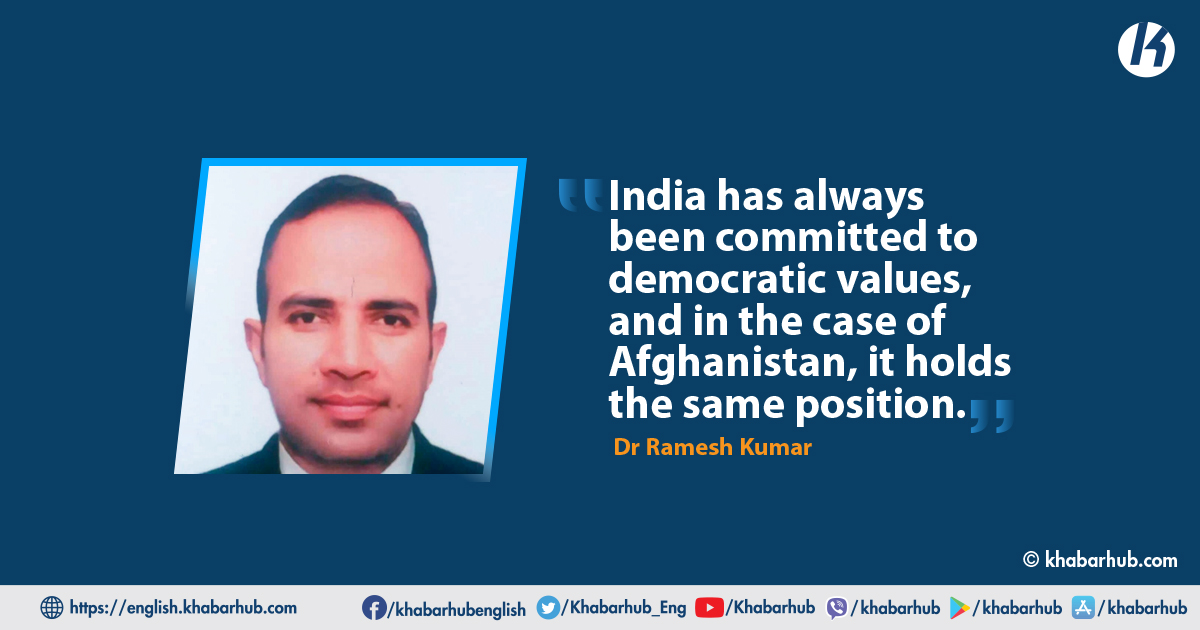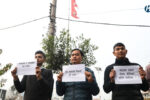These days South Asia seems to be in much turbulence because of the situations that have crept up in Afghanistan.
The provinces and districts of Afghanistan have been taken under control by the Taliban group. The people of the country are forced to live under the shadow of terror.
Consequently, things have been changing rapidly since the American Army’s withdrawal from Afghanistan and the growing domination of the Taliban in the country. This certainly has worldwide repercussions; particularly in Pakistan, Iran, China, Turkey, and India.
The Taliban, a non-state actor is trying to become a state actor as it seeks a seat in the UN for global legitimacy.
The Taliban wishes to rule Afghanistan in the same way as it did from 1996 to 2001 and expects an international affiliation and recognition from the whole world so that it may have a permanent government in Afghanistan.
India has always been committed to democratic values and in this case of Afghanistan, it holds the same position.
The reflection of India’s commitment could be traced in the speech of India’s Foreign Minister S.Jaishankar which he delivered in Shanghai Co-operative Council, wherein he stated that India is against violence and any attempt of seizing the government by force is illegal.
After the successful and swift fall of Afghanistan in the hands of the Taliban, the entire international system is wary, as this is not only expected to target major ongoing developmental programs and non-traditional foreign investors in Afghanistan but being one prominent fundamentalist Islamic organization and follower of radical Sharyat laws, it may not prefer basic fundamental rights and democratic value in the region.
At present, almost 2200 Indian people are working on different projects, so the security of these projects is under threat in India. On one hand, drugs- smuggling, Naxalites, and intrusions are very likely to creep up in Afghanistan, while on the other hand, religious fanaticism is most likely to spread in the backyard.
In this regard, the government of India must keep in mind that the 106 km geographical boundary of Jammu-Kashmir is connected to Afghanistan’s boundary.
Apart from this, the geostrategic position of Gilgit Baltistan is essential for India including a passage in its northwest side which has attracted China’s interest for a long time.
No one can deny the fact that China, the Taliban and Pakistan governments may support any terrorist group to create disturbance in India.
The steps of the Indian government to abrogate article 370 by making State Reorganization Act in Jammu-Kashmir and has included the regions of Mirpur and Muzaffarbad in its new map but this has not been accepted by member countries of Organization of Islamic Corporation including China, Pakistan and Taliban.
In the changed circumstances, the Taliban, with the help of Pakistan, will try to create disturbance in India under the United Islamic Agenda.
Therefore, India needs to be very alert. The Indian government has recently cooperated in the construction of the Jayaraj Delaram highway, Afghanistan’s most important highway, and is also connected with Iran’s Chabhar Port Milark passage.
This Chabhar Milark Jairaj Delaram Highway will open the Indian market for the exports of agricultural and many other goods to Afghanistan.
Now the security of all these highways will be a matter of worry. We will have to watch the Taliban response to the highway constructed with the cooperation of India in Afghanistan connected with all the districts of the country.
It is also yet to be seen whether the Taliban will permit the Asian International Railway Corridor Project smoothly to link Turkmenistan, Afghanistan and Kazakistan. Terrorist groups like Lashkar-e-Taiba and Jaish-e Mohammed which have established their camps in the regions of Afghanistan- Pakistan borders will try to spread their camps in the regions.
The Taliban’s control in Afghanistan indicates that Pakistan and its secret agencies will have an upper hand in Afghanistan.
The Taliban’s domination can also affect India – Afghanistan trade relations because Afghanistan will carry out its trade business through Gwadar and Karachi port. Thus, in the present circumstances, there is no point in India investing in Iran’s Chabhar port for Afghanistan.
Consequently, America and China have emphasized their connectivity through Pakistan. The Salma Dam and Jairaj Delaram Highway built by India have been captured by the Taliban. Moreover, many other big projects still under construction are also in danger.
The Taliban’s rise in Afghanistan can promote extremist Islamic fanaticism in the world. It has the potential to adversely affect India’s interest in the future. In the decade of 1980s Afghan Mujahidin were supplied weapons and bombs by America to defeat the Soviet Union.
But ten years later the Soviet Union did leave Afghanistan and many terrorist outfits came into existence thereafter.
But still, it is obvious that India’s future dealings in Afghanistan are not going to be easy. Relations with Afghanistan are going to be a tight-rope walk. Every step has to be taken cautiously.
Thousands of Hindus and Sikhs may take refuge in India on account of the rising dominance of the Taliban in Afghanistan. During the previous rule of the Taliban from 1996 to 2001, we find that the Hindus and Sikhs were either converted to Islam or slaughtered by the Taliban.
India has invested three billion dollars in the development of infrastructure in Afghanistan. All these projects will come to a halt with the rule of the Taliban in the country.
At present, almost 2200 Indian people are working on different projects, so the security of these projects is under threat in India. On one hand, drugs- smuggling, Naxalites, and intrusions are very likely to creep up in Afghanistan, while on the other hand, religious fanaticism is most likely to spread in the backyard.
In the present scenario, if we visualize the options for India, there are four alternatives. None of these is an easy one. It can even have a reverse effect.
Firstly, India must only support the democratic government in Kabul and also supply political as well as human resource assistance to the rehabilitated government.
The second option is that India continues to supply weapons and artilleries to Afghanistan National Defense and Security Force via Iran so that the Talibani government may be uprooted in the coming days.
But recently a Taliban spokesperson Suhel Shahini threatened that if India did so, it would have to face severe consequences.
If we talk about the third option then we need to strengthen our relations with the Taliban. However, we cannot benefit from this, because of the involvement of Pakistan. Such attempts have been made in past too by many other countries but have proved to be futile.
The fourth and the last option, India should wait and watch how the Taliban leads Afghanistan. It is difficult to assess right now how the Taliban will govern in Afghanistan; what policies will be adopted domestically and in dealing with the neighboring countries?
But still, it is obvious that India’s future dealings in Afghanistan are not going to be easy. Relations with Afghanistan are going to be a tight-rope walk. Every step has to be taken cautiously.
(Dr. Ramesh Kumar is Associate Professor, Department of Political Science, Central University of Haryana, Mahendergarh)









Comment